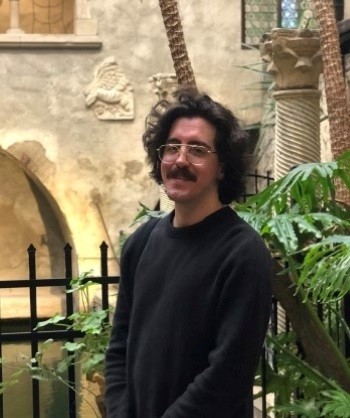

Visiting Assistant Professor

Stokes Hall S348
Telephone: 617-552-8542
Email: dalisera@bc.edu
ORCID 0000-0001-7913-6944
Modern History I and II
caves and stone in premodern Britain; early medieval ritual and religion; Old English literature; Pictish stones; North Sea environmental history; the history of the museum; digital humanities
Alexander D’Alisera is an interdisciplinary historian of premodern Europe, specializing in caves, stone, ritual, and religion across the medieval North Sea world. As a Visiting Assistant Professor at Boston College, he teaches courses in the global history core from the perspective of environmental studies, eco-criticism, and the history of religion. From 2024 to 2025, he held the Charles W. Maus Graduate Research Fellowship in Karst Studies at the Cave Conservancy Foundation.
Dr. D’Alisera’s book project, Medieval Cave People: A North Sea Speleology, c. 400-1200, unearths the history of ordinary people in extraordinary underground environments across the premodern North Sea region. Deploying archaeological and literary sources together with ecocriticism and landscape phenomenology, the book contextualizes local and regional human-cave entanglements within the broader environmental and religious histories of medieval Britain, Ireland, Scandinavia, and Iceland.
Dr. D’Alisera’s scholarship has also appeared in postmedieval, the Eerdmans New Testament Apocrypha book series, and Foillseachaidhean Rannsachaidh Oilthigh Ghlaschu (the University of Glasgow Research Publications), among other venues. With colleagues in the United Kingdom, he is currently co-editing an international volume on premodern stone, provisionally titled Interdisciplinary Perspectives on Stone and Society from Prehistory to the Middle Ages.
Prior to his current appointment, Dr. D’Alisera earned his Ph.D. in history from Boston College, having worked under the supervision of Professor Robin Fleming. He also holds an M.A. in religion from Yale University, where he was a Marquand Scholar at the Divinity School, as well as a B.A. in history and classical studies from Bard College.
“Teaching the Climate Catastrophe with an Early Medieval Poem,” in A Historian’s Handbook for Saving the World: Responding to the Global Climate Emergency, ed. Alexandra Hui and Emily Pawley (MIT Press, forthcoming).
“Durrow’s Lion: Irenaeus, Pictish Stonescapes, and the Book of Durrow’s Non-Hieronymian Evangelical Symbols,” in Ì Chaluim Chille: Interdisciplinary Studies on Iona and Columba on the 1500th Anniversary of the Birth of the Saint, ed. Sofia Evemalm-Graham, with Thomas Owen Clancy, Katherine Forsyth, and Gilbert Márkus, Foillseachaidhean Rannsachaidh Oilthigh Ghlaschu 1 (Clò Gàidhlig Oilthigh Ghlaschu, 2025), 208-233.
“Speluncar Slumber and the Medieval Time Traveler: Unearthing the Imagined Cave of the Old English Seven Sleepers,” postmedieval 15, no. 4 (2024), 969-989.
“The Dream of the Rood: A New Translation and Introduction,” in New Testament Apocrypha: More Noncanonical Scriptures, vol. 3, ed. Tony Burke (Eerdmans, 2023), 110-129 (with Samuel Osborn).
Review of David Ceri Jones et al., A History of Christianity in Wales (University of Wales, 2022), in Reading Religion 8, no. 9 (American Academy of Religion, 2023).
Translation of Beowulf, lines 151-165, in Beowulf by All, ed. Jean Abbott, Elaine Treharne, and Mateusz Fafinski (Arc Humanities, 2021).
Review of Jordan Zweck, Epistolary Acts: Anglo-Saxon Letters and Early English Media (University of Toronto, 2018), in Reading Religion 5, no. 7 (American Academy of Religion, 2020).